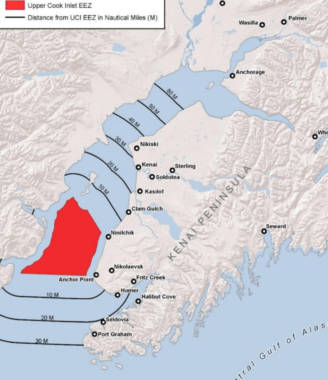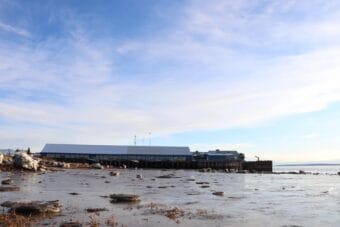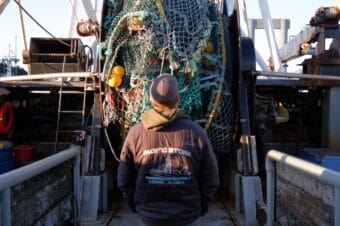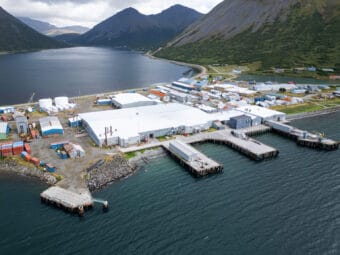
Federal managers voted Monday to close a huge swath of Upper Cook Inlet to commercial salmon fishing, capping a two-year fight over the fate of the fishery and its 500 permit-holders.
Those fishermen and representatives from the Kenai Peninsula turned out in droves to the North Pacific Fisheries Management Council meeting to oppose the closure and advocate for lighter conservation measures.
But when representatives from Alaska Gov. Mike Dunleavy’s administration said the state was unwilling to manage the area alongside the federal government, the council voted unanimously for the closure.
The 10-0 vote shuts down drift gillnet fishing in waters farther than three miles offshore, from the southern tip of Kalgin Island to Anchor Point. Fishermen like Georgie Heaverly, of Anchorage, said the area is a crucial fishing ground and that the closure will reverberate across industries.
“Fishermen have been leaving the fishery already for the last several years,” she said. “It’s hardly economically viable, and this really is the nail in the coffin.”
For years, fisheries management of Upper Cook Inlet’s federal waters was under state jurisdiction. But in 2013, United Cook Inlet Drift Association, advocating for the commercial industry, filed a lawsuit in an effort to revert management to the federal government.
The courts sided with UCIDA in 2017, and the council was tasked with drafting a new salmon management plan. This fall, two years into a process that involved collaboration from groups of stakeholders, Dunleavy’s administration introduced the option of closing the federal waters to commercial salmon fishing completely — a proposal known as “Alternative 4.”
It was a controversial idea. In the weeks leading up to the meeting, hundreds submitted comments in opposition, including the Kenai Peninsula Borough Assembly, the cities of Kenai and Homer, Rep. Ben Carpenter, R-Nikiski, and Sen. Peter Micciche R-Soldotna.
Micciche now says he thinks the council’s decision will be challenged in court.
Rather than an outright closure of the federal waters of Upper Cook Inlet, opponents of Alternative 4 asked the council to turn management over to the state, with federal oversight.
Council members rejected fishermen’s plea for state management after hearing from the Dunleavy administration. Rachel Baker, the deputy Fish and Game commissioner who represents Dunleavy’s administration on the council, said the state does not want to take on the burden of managing fishing in Upper Cook Inlet’s federal waters.
Andy Mezirow, who runs a charter fishing business in Seward, is the one council member who lives on the Kenai Peninsula.
He said he was worried about the impacts of the decision on his neighbors. But he added that if the state would not agree to joint management, he would reluctantly support the closure.
“I’m not an expert on states’ rights, but it seems like almost everyone agrees that the state should be the one that’s ultimately managing this fishery,” he said.
A big concern among opponents is that the closure will make matters worse for seafood processors, who are already strained by poor fishing seasons the last couple of years. And it’s hard for drift and set-net fisheries to stay open if processors are closing, says Robert Ruffner, a former member of the Alaska Board of Fisheries and a resident of Soldotna.
“Our communities are going to suffer pretty heavily, probably more than the numbers reflect in terms of the harvest that occurs out there, because our processors are rapidly becoming the limiting factor in what they can continue to stay open and operate under those environments,” he said.
Homer, in particular, would be hard hit by the decision, according to the council’s report.

(NOAA)
At least one group of fishermen supported the action. The Kenai River Sportfishing Association, which has close ties to Dunleavy’s administration, submitted the lone comment in support of closing the federal waters to fishing.
Executive Director Ben Mohr said he would prefer state management of the fishery than total closure. But after the court’s decision in the UCIDA lawsuit, he saw the closure as the best path forward.
“We weren’t seeking to shut down the commercial fishery or anything like that, that’s not what we’re about,” he said. “It was solely about who manages those fish and defending the state’s primacy to manage our fish and wildlife resources for the benefit of all Alaskans.”
Most other waters in Alaska under federal jurisdiction are closed to commercial salmon fishing.
Baker said at the meeting that benefits to other groups might balance out its negative effects. Smaller harvests in the federal waters could lead to better harvests in other parts of the inlet, like for sportfishing groups, commercial set-netters and northern inlet drift fishermen.
The closure will not go into effect before the upcoming 2021 season, since it still needs to be approved by the secretary of the Department of Commerce and the National Marine Fisheries Service.
Jim Balsiger, the service’s regional administrator, was the one member of the council to abstain from voting Monday.


